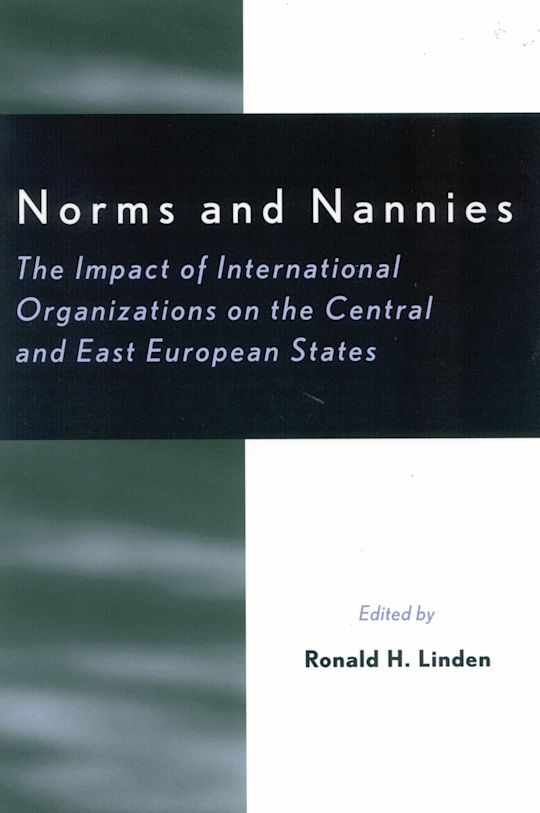Norms and Nannies
The Impact of International Organizations on the Central and East European States
Ronald H. Linden (Author) , Pavel Cernoch (Contributor) , William R. Clark (Contributor) , Annette Freyberg-Inan (Contributor) , Alex Grigorescu (Contributor) , Mark Hallerberg (Contributor) , Geoffrey Harris (Contributor) , Elena Iankova (Contributor) , Wade Jacoby (Contributor) , Andrew Michta (Contributor) , Melanie H. Ram (Contributor) , Zlatko Sabic (Contributor) , Frank Schimmelfennig (Contributor) , Beate Sissenich (Contributor) , Lucio Vinhas de Souza (Contributor) , Margit Besseney Williams (Contributor)
Norms and Nannies
The Impact of International Organizations on the Central and East European States
Ronald H. Linden (Author) , Pavel Cernoch (Contributor) , William R. Clark (Contributor) , Annette Freyberg-Inan (Contributor) , Alex Grigorescu (Contributor) , Mark Hallerberg (Contributor) , Geoffrey Harris (Contributor) , Elena Iankova (Contributor) , Wade Jacoby (Contributor) , Andrew Michta (Contributor) , Melanie H. Ram (Contributor) , Zlatko Sabic (Contributor) , Frank Schimmelfennig (Contributor) , Beate Sissenich (Contributor) , Lucio Vinhas de Souza (Contributor) , Margit Besseney Williams (Contributor)
You must sign in to add this item to your wishlist. Please sign in or create an account
Description
As they seek to join the West, the Central and East European states face challenging expectations for domestic and international political behavior. Key Western organizations, especially the European Union and NATO, hold out the promise of membership in return for adherence to specific European norms and standards. The benefits of membership are high, generating equally high pressure on governments to adopt Western norms. In this first comprehensive volume on the subject, contributors examine how this process operates in a variety of domains, including civil-military relations; social, labor and regional relations; economic and information policies; and foreign policy. Each author considers, inter alia, what norms are generated by (or absent from) European international organizations; how they are communicated to prospective members; and, most important, what impact they have had on the policies and actions of individual countries as well as on the region as a whole. Drawing from both Central and Southeastern Europe, these on-the-ground studies provide the empirical foundation needed to support theories of norm diffusion, constructivism, and liberalism in international relations and comparative politics alike.
Table of Contents
Part 2 PART I: European Organizations and East European Democracy
Chapter 3 The Democratic Dimension of EU Enlargement: The Role of Parliament and Public Opinion
Chapter 4 Transferring Transparency: The Impact of European Institutions on East-Central Europe
Part 5 PART II: Impact on Countries
Chapter 6 Slovenia and the European Union: A Different Kind of Two-Level Game
Chapter 7 Which Way to Progress? The Impact of International Organizations in Romania
Chapter 8 NATO Standards and Military Reform in Poland: A Revolution from Without
Chapter 9 Security and Identity in Southeast Europe: Bulgaria, NATO and the War in Kosovo
Part 10 PART III: Impact in Policy Areas
Chapter 11 Transformation, Accession to the European Union, and Institutional Design: The Fate of Tripartism
Chapter 12 European Integration and Minority Rights: The Case of Hungary and its Neighbors
Chapter 13 Harmonizing Laws with the European Union: The Case of Intellectual Property Rights in the Czech Republic
Chapter 14 The Diffusion of EU Social and Employment Legislation in Poland and Hungary
Chapter 15 The Pivotal EU Role in the Creation of Czech Regional Policy
Chapter 16 Political Business Cycles in EU Accession Countries
Chapter 17 Conclusion: International Organizations and East Europe-Bringing Parallel Tracks Together
Product details
| Published | 16 Oct 2002 |
|---|---|
| Format | Ebook (Epub & Mobi) |
| Edition | 1st |
| Extent | 256 |
| ISBN | 9781461639596 |
| Imprint | Rowman & Littlefield Publishers |
| Series | The New International Relations of Europe |
| Publisher | Bloomsbury Publishing |
About the contributors
Reviews
-
R. H. Linden has edited a book with a clear theme and with an intriguiging title. The overall theme is coherent in showing how, why and to what degree the norms of the International Organizations have become entrenched in the Central and East European Countries.
Seer
-
A very good book-theoretically grounded, empirically rich, and wide ranging.
European Integration
-
Norms and Nannies will stimulate..discussions through its innovative findings, both in theory and research. It will also encourage them through its appealing style...
International Studies Review
-
This book makes a welcome and useful contribution to the debate on the post-communist transformation and Europeanization of CEE states, primarily because of its wide-ranging and informed coverage of many of the issues that remain on these states' political agenda.
European Foreign Affairs Review
-
Norms and Nannies stands out because of its integration of political theory in the economic and social environment of the CEEC. The relevant issues are described with clarity, which makes the analysis understandable to professionals from the disciplines of economics, law, international relations, foreign policy, and development studies. The theoretical part of the book reveals that the targeted audience is students of political science, but the book also provides useful information for the aforementioned disciplines.
Perspectives on Political Science



































